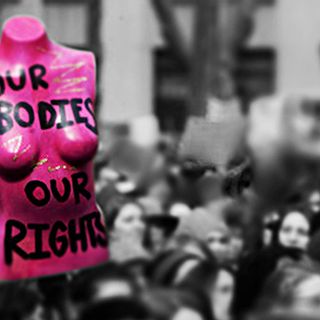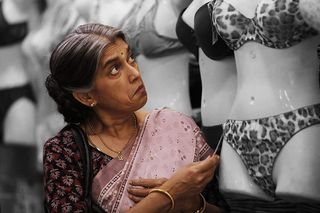
Post‑Menopausal Libido Is More Complex than Just Hormones
Sex drive can also be impacted by losing a partner, having less time for sex, or struggling with mental health issues.

Older women are largely believed to be disinterested in sex, which has been attributed by the scientific community to the permanent changes their bodies undergo during menopause — hormonal fluctuations of estrogen and testosterone, which can lower sex drive and cause vaginal dryness that can make intercourse painful. But a recent study, published in the journal Menopause sheds light on external social factors that contribute to a decrease in older women’s libido in addition to hormonal changes they experience.
In India, the average age for a woman to start menopause — when women stop menstruating due to exhaustion of their ovarian eggs — is 46.2 years, with an approximate duration of five years, according to a report by the Indian Menopause Society. But older women are excluded from the narrative of sex, so much so that a nationwide survey of thousands of Indian households — the 2016 National Family Health Survey-4 — which documents women’s sexual lives, only includes women between the ages 15 to 49. It’s as if women older than 49, right in the middle of menopause, suddenly lose all ability to be sexual.
Menopausal and post-menopausal women’s sex drive is a scarcely studied phenomenon — the new study attempts to provide familial and societal factors that affect older women’s sex drive to contextualize the already ill-informed stereotype. The researchers initially surveyed approximately 24,000 British women, between ages 50 and 74, for an ovarian cancer screening project, during which the participants had to provide details of their sex lives. Around 4,500 women ventured beyond the standard questionnaire to detail the various experiences that had affected their sex lives — many of which weren’t related to menopause at all. 78% of the 4,500 women reported having had intimate partners, but only 49.2% reported having active sex lives; the reasons they gave included losing a partner, not being able to make time to have sex, being with a partner with physical problems or having physical problems of their own, struggling with mental health issues, not being interested in sex, or being with a partner who had lost interest in sex.
Related on The Swaddle:
Women’s Sex Drive Isn’t Lower Than Men’s; It’s Just More Variable
“Menopause is typically a time when the woman begins to understand herself,” said Dr. Shivali Saraiya, 52, a physiotherapist based in Ahmedabad, Gujarat. Before then, kids and family life take over, which leaves little time for the woman to contemplate her own biology, she added. Saraiya often counsels her patients regarding their sex lives, as it is inherently tied to their physical wellbeing; “stress-related issues, back issues, disc pain — many of my patients have a lot of difficulty having sex. When the hormonal changes kick in, they don’t have any idea what to do,” she adds.
For D.S., 48 and single, the hormone fluctuations have started, which makes sexual desire an unpredictable experience for her. “It comes in waves for me. Some days of the month, it’s the last priority, and some days I’m feeling it so much,” she said. “If you don’t have the desire, you do feel an emptiness and you feel the fear also that in the next five years I may not have it at all. Then what do you do?” For D.S., menopause has largely been accompanied by a lack of confidence, which she says affects her interactions with potential partners. “I’m a little scared of not having a sex drive. Because I do want to be close to someone and have that experience,” she said. “I didn’t ever have abdominal fat but now I do; my skin, my wrinkles — all of it decreases my confidence,” D.S. said, adding that the older she gets, the less she feels likely to find a long-term partner with whom she has an emotional connection — a pre-requisite for D.S. to have a fulfilling sex life. “I’m not ready to make peace with it.”
Women in long-term relationships, on the other hand, often do not prioritize themselves within their families, especially in a collectivistic culture such as India. They seldom evaluate how they feel or what they want, Saraiya said, adding that when menopause hits, they are caught unaware of what’s happening to their bodies. “It’s all repressed, totally clogged up. [My patients] ask me — ‘can I actually have sex?’ They tell me they’re uncomfortable doing it. Sometimes they cry or are angry about their situation; they have no psychological support; they’re going through other health issues that go unresolved,” Saraiya said, adding that most of the time, the husbands’ understanding of what’s going in the women’s lives is poor; those who attend appointments with their wives even leave her office when she addresses their wives’ menopausal changes. In such social conditions, it’s not just the hormonal biology that impacts a menopausal woman’s sex drive; it’s all of the unaddressed personal and societal changes during menopause that contribute to a change in sexual lifestyle, and resulting frustration.
Related on The Swaddle:
What Sexual Dysfunction Looks Like When Female Sexual Dissatisfaction is the Norm
“Women say that they are sorry that things have changed. They wish it was different,” Dr. Helen Harder, one of the researchers who compiled the data for the study published in Menopause, told the New York Times. “But in general, it’s not being brought up in discussions. Patients need reassurance that it’s okay to discuss sex and ask questions. If you do that, it’s probably a good step toward making changes.”
Personally, Saraiya, whose perimenopause lasted for an excruciating 11 years, says a host of external factors affected her sex drive until menopause ended for her a year ago, at 51. Conscious of her looks and fond of exercising, Saraiya said she gained weight during menopause (a common side-effect), which contributed to feelings of dissatisfaction and irritation already present due to fluctuating hormones. “It’s like you’re caught up in a storm,” Saraiya said, adding, “I felt like not wanting to exercise; I was tired, bored; libido wasn’t even a consideration for me because the other factors were weighing on my mind.”
The decline of sex drive before, during and after menopause, for Saraiya, wasn’t a crisis, but a process of gradual acceptance, she said. This was largely because she kept herself informed of the changes her body was undergoing through extensive reading, and through verbal, open and honest communication with her partner. “Whenever I felt uncomfortable, I told [my husband], ‘Can we cuddle?,’ ‘Can we talk?'” she said, adding that explaining why she didn’t want to be touched really helped their relationship and has led to a healthier sex life with him post-menopause.
Saraiya said she is inclined to expand dialogue with her patients, as well as their partners, about menopause and all the mental and physical changes it encompasses. “How can you deal with something you don’t understand?” It’s also important physicians develop a better understanding of the woman’s mind and body with regard to menopause — she said many patients start crying when she asks them about the issues they face and tell her that few doctors have ever asked them about their mental and emotional health. One thing’s clear, Saraiya said: Women and their families need to be taught how to deal with menopausal changes in order to be happy with age. “Lack of information in our country is producing a lot of fear. It needs to be dealt with, because at the end of the day — your body can’t go backwards.”
Rajvi Desai is The Swaddle's Culture Editor. After graduating from NYU as a Journalism and Politics major, she covered breaking news and politics in New York City, and dabbled in design and entertainment journalism. Back in the homeland, she's interested in tackling beauty, sports, politics and human rights in her gender-focused writing, while also co-managing The Swaddle Team's podcast, Respectfully Disagree.
Related


Study: When Adult Kids Move Out, Parents Experience More Joy From the Parent‑Child Relationship
